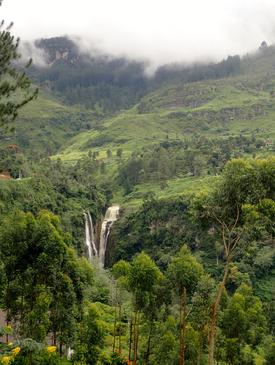Restoration of Degraded Lower and Upper Montane Forests in Sri Lanka's Wet Zone
Summary
Sri Lanka's central highlands is the main watershed of almost the entire country with most of the major rivers originating from this region. Historical deforestation and forest degradation have been the heaviest in this region due to agricultural expansion, which continues even to date. As a result of this reduction in natural forest cover, biological diversity and the valuable ecosystem services that it provides have been seriously diminished.
As the damaging effects of deforestation and forest degradation are clearly evident in the montane fragile area of the country, there is an increasing recognition of the urgent need for the conservation and restoration of these forests. Consequently, the National Planning Department of Sri Lanka has identified and demarcated a central fragile zone within an altitudinal belt of around 500 m to 2100m as an environmentally sensitive area with high risks of soil erosion and landslides as a result of prevailing improper land use, particularly in areas with steep and rugged topography. Restoration of native species diversity and the ecosystem services they offer in appropriate areas within this region is a national priority.
The Ministry of Mahaweli Development and Environment has designated a national tree planting program, 'Vanaropa', to increase the forest cover by 3%, which translates into about 180,000 ha, over a period of three years starting in 2016. The most important ecosystem services the forest cover critically needs to provide in the montane region, an important target area for the ‘Vanaropa” program, are the regulating services that include, regulation of water, climate, floods and disease and supporting services such as soil formation, nutrient cycling, erosion (and fire) control and primary production. These in turn would enrich the habitats of the indigenous and naturalized biota that sustain other provisioning services for human well being.
Understanding the ecological processes that relate to forest functioning can guide decision-making and the development of strategies for effective forest restoration and sustainable land management. This knowledge is indispensable for managing the provision of environmental services in a sustainable manner in human modified landscapes, which are often highly fragmented and isolated.
This four-day training course aims to introduce the basic and applied ecological principles and techniques to design and implement restoration strategies to increase forest cover and in turn facilitate the provision and regulation of ecosystem goods and services, with special emphasis on the critical watersheds and fire-prone areas of the montane region. It will convey these principles and practices through a series of lectures based on case studies and field-based observations and exercises.
Content
Day 1
- Welcome Address by Conservator General of Forests/ Regional Deputy Conservator of Forests/ Director of the Sri Lanka Forestry Institute
- General Introduction to "Forest Restoration" - Dr. David Neidel
- Policy/Regulatory Context for Forest Restoration in Sri Lanka - Mr. Anura Sathurusinghe
- Complexity of Upper/Lower Montane Natural Forests & the Ecosystem Services - Profs. Nimal & Savitri Gunatilleke
- Natural Forest Degradation/Deforestation and their Drivers relevant to Montane Forests of Sri Lanka - Prof. Nimal Gunatilleke
- Forest Restoration Methods relevant to Sri Lanka with an emphasis on the Montane Region - Prof. Nimal Gunatilleke & Dr. Thilanka Gunaratne
- Forest Restoration Efforts in Badulla/Moneragala/Nuwara Eliya Divisons - Ms. Bandumala
Day 2
- Field visit to Kandapola Forest Reserve and Eucalyptus Plantation
- Group exercise on Kandapola field visit
- Lessons Learnt from Restoration Programs Elsewhere in the Tropics - Dr. David Neidel
- Indicators for Monitoring Success of Forest Restoration I - Dr. Saranjan Fernando
- Indicators for Monitoring Success of Forest Restoration I - Dr. Enoka Kudavidanage
Day 3
- Field visit to Kande Ela-Ambewela Area
- Group exercise on Kande Ela Ambewela field visit
- Seedling Ecology/Plant Propagation for Restoration Activities - Prof. Pushpakumara & Dr. Sisira Ediriweera
- Management of Restoration Sites: Ecological, Social, and Economic Aspects - Prof. Pushpakumara
Day 4
- Field visit to Forest Department's Welanhinna Restoration Trial
- Group Projects to Establish Restoration Plans for Restoration Trials
- Introduction to the ELTI Leadership Program - Dr. David Neidel
- Course Evaluation & Issuing of Course Certification
- Closing Remarks - Anura Sathurusinghe


